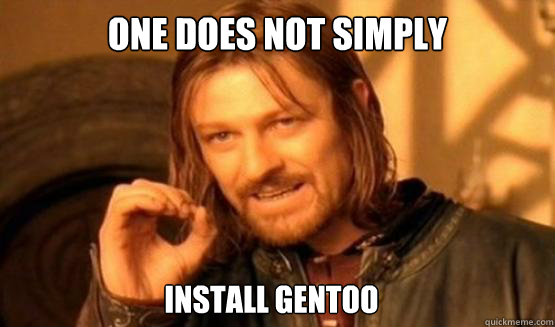Finally, nothing but US politics and jean memes all the time!
Finally, it’s Gentoo’s time to shine!


Voyager runs Arch, BTW.
Not really, of course. LCARS is based on Hannah Montana Linux.
The irony is that I’m using Voyager on Android. An LCARS skin would be great, and now I’m shocked there isn’t a Trek-themed Lemmy client.

Let me introduce you to Total Launcher + TREK Total Interface (Paid addon, but worth every penny)
I had’t thought of that, but it is kind of weird that no-one has gone all in with a ST themed Lemmy frontend.
In the aftermath of World War III, Earth found itself in a period of profound reconstruction. Amidst the rebuilding of infrastructure and reestablishment of global communication networks, a significant technological shift occurred—a transition that would eventually shape the future of computing across the United Federation of Planets. The proprietary operating systems that once dominated the computing landscape, Windows and macOS, had their development and support structures irrevocably damaged during the conflicts. Their closed-source nature meant that without the original companies and their specific infrastructure, recovery and continuation of their use became impractical.
In the vacuum left by these giants, Linux, an open-source operating system kernel developed in the early 1990s by Linus Torvalds, began to flourish. The collaborative and transparent nature of Linux’s development made it not only possible but practical for a disparate and recovering world to adopt and adapt it to their needs. Volunteers from enclaves of survivors and later, from emerging new governance bodies, contributed to the Linux kernel, ensuring its evolution and relevance in a rapidly changing world.
As the decades passed, Linux became more than just a stopgap solution; it became the backbone of the new world’s computing infrastructure. The open-source ethos that defined its development paved the way for an era of unparalleled innovation in software. By the 22nd century, Linux had evolved far beyond its initial kernel beginnings into a sophisticated operating system known for its reliability, adaptability, and security.
It was this Linux, enriched by over a century of global collaborative development, that laid the groundwork for what would become the Library Computer Access/Retrieval System (LCARS). LCARS, with its distinctive interface and advanced computational capabilities, became synonymous with the technology of the Star Trek era, used extensively throughout Starfleet and the United Federation of Planets. The principles of openness, collaboration, and adaptability that were integral to Linux’s success were also embedded in the core of LCARS, allowing it to evolve and meet the needs of a vast and diverse galaxy.
Thus, Linux is not merely an ancestor of LCARS; it is its foundation. The journey from the post-war world to the era of starships and space exploration was made possible by the resilience and innovation inherent in the Linux operating system. This legacy of collaboration and openness continues to define the technological landscape of the Star Trek universe, embodying the spirit of exploration and unity that characterizes the Federation itself.
Did you write this yourself? Amazing! Star Trek and GNU/Linux cross-wet dream
You could be lying right to my face and I would never know.
Not Moe!

Disgusting! How are you bypassing my block with this animated pornography?
What can I say, I’m gay for Moleman.
“Nothing but US politics” that’s a lie because genocide is also blocked. How can you discuss US Politics without discussing US sponsorship of genocides???
It’s the same conversations but everyone uses the word “liberate” instead so it’s much more pleasant
This guy Americanises.
Bold. Pescatarianism, but not vegan. Bold.
B eans
Blocking moe communities is a never ending task.
Honestly how I feel about aigen communities.
I want to know the story behind filtering pescatarianism
We do a little trolling, as a treat, on people who rigidly hold to other, unnamed diets that are stricter, and also what they feed their pets. We do not, in accordance with the rules, bring up such arguments here.
The main designated asshole protagonist claiming to be pescepescetarian (only eat fish that eat other fish) is still one of my favorite parts of Silicon Valley 😄
You guys get jean memes?
No, they all got stolen by jean stealers
What about beam memes???
Acceptable, but rare and precious
god i’m dumb, instead of filtering out moe i blocked every moe lemmy by hand. it’s not like i didn’t use filters before either, it was simply a dumdum moment
First world problems: hearing about active genocide is such a downer.
but… it’s good for longevity…
Arch? Only if you have time to maintain it and do regular updates! I just use Mint (btw) and have auto-updates turned on. It only bricks the machine once or twice a year, easily resolved with a quick reinstall.
im about to end my life
Maybe I’m missing a joke, but just in case, please sleep on it before you commit to anything. Nothing improves after it ends.
I thought it was pretty obvious that my initial comment was referring to pescatarianism. I’m pescatarian myself; it’s good for longevity. Then you responded with an Arch meme—hilarious btw—; I thought you had misunderstood my initial comment on purpose to undermine my comment on pescatarianism, which would make sense considering you showed a screenshot wherein “pescatarianism” is one of your filtered keywords.
I then responded with an exaggerated expression of dismay.
No need to be concerned for my well-being at this time, though I do appreciate the sentiment! I’m writing this right after waking up from a good night’s sleep, for the record.
It only bricks the machine once or twice a year, easily resolved with a quick reinstall.
The fact that It’s not certain that you’re being sarcastic says a lot abut the scores of “my favorite distro of Linux is easy to use with no serious drawbacks” evangelists on Lemmy 😄
I haven’t seen the jeans memes in an age.
Star trek?










